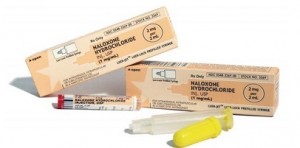
The Department of Health and Human Services (HHS) will provide more funds to distribute the opioid overdose antidote naloxone to first responders and family, USA Today reports.
On Thursday, HHS will announce an expanded grants program for states to buy naloxone. The announcement is part of a larger effort to reduce deaths from opioids including heroin and prescription painkillers. Overdose deaths due to heroin rose 39 percent from 2012 to 2013. More than one-third of all overdose deaths in 2013 were due to prescription opioids, the article notes.
“We know that naloxone is saving lives,” said Michael Botticelli, Director of the Office of National Drug Control Policy. The HHS plan to increase naloxone’s use “will go a long way toward reducing overdose deaths, which have devastated so many families and communities across the country.”
HHS will try to reduce overprescribing and inappropriate prescribing of opioid painkillers. It will also expand overdose reversal programs, and increase access to medication-assisted treatment programs, as well as counseling.
The agency said it will work with lawmakers to require specific training for medical professionals for safe opioid prescribing, and to establish new opioid prescribing guidelines for chronic pain. HHS will also increase investments in state-level prevention interventions, including prescription data monitoring programs, which track opioid prescribing in an effort to deter “doctor shopping.”
The high cost of naloxone has prevented its widespread use. In some cases, prices for the drug have increased by 50 percent or more.
The antidote has long been used by emergency rooms and paramedics. Recently, the World Health Organization said increasing the availability of naloxone could prevent more than 20,000 deaths in the United States annually. Naloxone works quickly, without side effects.
A growing number of states have passed laws increasing access to the antidote.
Published
March 2015
 Get Support
Get Support
